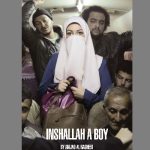A creative directorial approach and powerful performances from non-actors are at the heart of Capernaums hard-hitting narrative. Read our interview with the director-producer couple Nadine Labaki and Khaled Mouzanar.
 When Lebanese director Nadine Labaki speaks about Capernaum, the film that catapulted her to fame, first at Cannes in May last year and later when it was nominated for a Best Foreign Language Film Oscar, we can see why the theme of undocumented immigrants in her country and the consequences for children had become an obsession until it found its voice through cinema.
When Lebanese director Nadine Labaki speaks about Capernaum, the film that catapulted her to fame, first at Cannes in May last year and later when it was nominated for a Best Foreign Language Film Oscar, we can see why the theme of undocumented immigrants in her country and the consequences for children had become an obsession until it found its voice through cinema.
It was my need to talk about these undocumented children who were paying the highest price for our wars, and how insensitive we had become, says Labaki. It was the igniting point of this journey and I just wanted to be in their head and see how they viewed us adults. If a child could vocalise his feelings, what would he say and how would he address the whole journey he has experienced?
That led to the making of Capernaum, which received a 15-minute standing ovation when it premiered at Cannes and went head to head with Netflixs Roma in the Oscars race. Though it did not win the Oscar, it won the hearts of audiences around the world.
The plot revolves around 12-year-old refugee Zain (Zain al Rafeea), who takes his parents to court for giving him life and demands that they be stopped from bringing any more children into the miserable existence that he is subject to. Zain runs away from home after a row with his parents and ends up with an Ethiopian refugee, Rahil (Yordanos Shiferaw), and her baby son, Yonas (Boluwatife Treasure Bankole). The story is set in Lebanon but is a universal tale of the tragic conditions in which undocumented immigrants and their children live.
With powerful performances, strong direction from Labaki and the steadfast support of her husband Khaled Mouzanar, producer and music composer on the film, Capernaum lays out a compelling argument for revisiting how we view refugees who have had to flee their war-ravaged homelands and become nameless faces in other nations, where they are continuously exploited.
Capernaum impresses for many reasons. The film does not just have a social message; it turns the entire filmmaking process on its head.
In countless interviews, the husband-wife duo say that filming with children who are non-actors wasnt easy. But how exactly did they get the best out of them? They appear to have thrown all they had learned about traditional filmmaking out the window, to take a free-style approach.
The story is fictitious, but it is based so much on reality because we did three years of research while writing it, says Labaki. We went to unfortunate neighbourhoods, detention centres, shelters, homes and prisons. We spent hours in court just sitting and watching cases. So everything we wrote was built on what we saw, and sometimes we were shooting scenes that were so close to reality that we could no longer tell the difference between fact and fiction.
Two days after we shot the scene of Rahil getting arrested at the cybercafé, for instance, she actually got arrested. Like in the film, Rahil had indeed run away from her employer in real life. She didnt have a baby like in the film, but she was living in Lebanon illegally, and while we were working on her papers, she got arrested.
It was my need to talk about these undocumented children who were paying the highest price for our wars … [that led to the making of this film]
 If you look at the little boy Yonas in the film, he is played by Treasure, an illegal girl child living in Lebanon with her parents, without any papers. For all practical purposes, she is invisible. Her parents were arrested along with Rahil in the same raid. So the whole time, we felt like we were capturing reality, because what we wrote as part of a fictional script was literally happening to those who were playing those roles in the film, Labaki says.
If you look at the little boy Yonas in the film, he is played by Treasure, an illegal girl child living in Lebanon with her parents, without any papers. For all practical purposes, she is invisible. Her parents were arrested along with Rahil in the same raid. So the whole time, we felt like we were capturing reality, because what we wrote as part of a fictional script was literally happening to those who were playing those roles in the film, Labaki says.
Owing to the quasi-documentary nature of the film, where the lives of her actors mirrored those of her characters, Labaki made a conscious decision to go with the flow and adapt her screenplay instead of going strictly by script. She points out, however, that the end product is not very different from what was scripted.
The script had a strong base as a starting point and a landing point. If your script is solid, you can still improvise but remain grounded and focused. This way, when life throws you an opportunity or if the circumstances and the actors take you somewhere else, you are not afraid to explore those opportunities because you know that eventually you will navigate it back towards the script that was written. It was like life was giving us these gifts that helped make our film better, so we were never scared to explore them because we were shooting so close to reality, she says.
Fortunately, her crew shared that passion and freedom to explore other journeys along the way without questioning the idiosyncrasies behind it. This is what made Capernaum possible, Labaki says.
Sometimes you let things happen the way they are happening. The code between us as a team and crew was to have minimal interference. Our characters were not actors who came to the set prepared and knew their lines by heart. We had to create the right space for them to be who they are and to react to the situations that we created as filmmakers and scriptwriters. Therefore, they reacted spontaneously.
And this was the same for all situations. For instance, if the set designer had to bring a mattress to the scene, he had to bring one that had lived the same situation, not a new mattress. Everything had to be authentic and part of that experience. Thats why we shot for six months and in chronological order, something that is not done in traditional filmmaking, she explains.
The team never stopped traffic or asked people to stand by while they shot a scene. They just blended in with the crowds again, quite uncommon for a traditional film shoot.
We became so invisible that as we were shooting the scenes in the souq with Aspro (the man who was organising the journey for some undocumented immigrants to go to their promised lands), people would walk up to him and negotiate a deal. Its almost like we were not even there; they just went about their business as if we were invisible.
In parallel, Mouzanar, a music composer by profession, quickly realised that he would have to don several hats if this film was to see the light of day.
While we were working on this script, we understood that we needed a lot of time to get the right level of performance from the kids. We needed a lot of time to shoot, to edit, and so we ended up doing six months of shooting and two years of editing, and we realised no producer would accept this.
We did our previous film in the classical way, so we had a French producer and funds; all the post was done in Paris. These are the traditional ways to produce films in the Middle East and its hard to go further than a month or two of shooting and four months of editing. So we decided to produce the film ourselves and ended up doing everything from script to screen practically at home, says Mouzanar, who eventually learnt every aspect of filmmaking while shooting Capernaum.
I had to live in the smell of the slums and feel its violence and its dirt. So the music had to be dirty and humble at the same time, and I had to change from the violin to the Cretan lyra [to reflect that]
 The couple rented a house below their home and had the core team of scriptwriters, producers and executive producers live with them for the next two to three years. In fact, they mortgaged their house to fund the film.
The couple rented a house below their home and had the core team of scriptwriters, producers and executive producers live with them for the next two to three years. In fact, they mortgaged their house to fund the film.
At the end of the project, we had around a thousand people on our payroll, confides Mouzanar. He also explains the rationale behind renting a number of locations for six months and shooting in chronological order.
You normally shoot all the scenes in one location and then move on, but we needed to see the relationship between Zain and Yonas grow progressively stronger. They are kids, not actors. When they meet for the first time, they are complete strangers. Six months later, you can see that they have bonded and become friends, and that shows by the end of the film. This was a psychological choice we made to ensure that the kids could adapt to each other. This impacts the production, but because we did it at home, it cost a lot less. But it was hard.
Perhaps the biggest challenge for Mouzanar was scoring the film.
We had around 520 hours of footage, which we then edited down to 14 hours. How do you score for a film like that? Where do you begin? Initially, I had planned this very romantic and sentimental music to go with what we had scripted. And then when I met the real actors, they were nothing like the soft, sweet music I had planned.
My perspective changed when I lived in the slums with the people there. Being a producer helped in that way. I had to live in the smell of the slums and feel its violence and its dirt. So the music had to be dirty and humble at the same time, and I had to change from the violin to the Cretan lyra, which is a more humble sound so the music was more primitive, and yet it had to be contemporary because it was almost prophetic. It was no longer a local Lebanese story because every city in the world in the next 50 years will have a Capernaum and such slums in the suburbs, with people living in the most inhumane conditions. The music, therefore, had to have that raw and primitive feel to it while also taking on Biblical, futuristic tones.
Mouzanar also realised that music was not very easy to place in the film, due to its quasi-documentary nature. After a lot of trial and error, the team divided the film into chapters. In some, there is no score, just the sound of the city.
For the viewer to be immersed in this Capernaum, in this chaos, sometimes we just kept it dry; and in other places, where the documentary becomes more poetic and dreamy, with slow motion and aerial shots, where we felt the score had something to say, we allowed ourselves to put in a real score. So the whole film was like this, very dry in some places and very poetic in others, explains Mouzanar.
Shooting in 4K, mixing in 5.1 Surround and editing 500-plus hours of footage brought along a whole set of technical challenges.
I had to re-equip my music studio with Dolby Surround so we could mix in my studio, and I had to learn to mix in 5.1. In hindsight, the whole thing was crazy because while shooting, I was trying to see how many editing venues we needed. We started with one and ended up with four. We had four stations for editing, four for sound editing and two for mixing, because we had 500 hours of footage and we needed to be ready for Cannes.
It was only three months after Cannes, though, that Capernaum was fully ready. We re-edited, re-recorded and remixed.
Asked if the team would do things differently in hindsight, Mouzanar says: Artistically, no. We shot in a manner that afforded us full artistic freedom. No one has done anything like we have done. When I started, I didnt know what an associate producer was and who does what we were learning along the way. When we reached Cannes, I was even selling the film. Now I know all aspects of filmmaking, although the one I like best continues to be music composition.
 On how the director wife and the producer husband addressed creative tension, Mouzanar says: Theres a lot of arguing, but both of us are conscious that art is bigger than us and at the end of the day, art is more important.
On how the director wife and the producer husband addressed creative tension, Mouzanar says: Theres a lot of arguing, but both of us are conscious that art is bigger than us and at the end of the day, art is more important.
They also declare that the film has changed them forever.
I have matured along the way. With your first film, you dont know what tools and expertise or skills you need to achieve your vision. I was experimenting and learning how to lead the crew and hold the rhythm of the film, which is not a 30-second ad, says Labaki, who previously worked in advertising.
Sometimes we were shooting scenes that were so close to reality that we could no longer tell the difference between fact and fiction
I have always dreamt of achieving what I have achieved now, but did not have the tools to do it back then. Now I do, and it has given me wings. It has shown me how to get those great performances from people. It has changed me. I will never go back to the normal way of making a film. I loved the chaos that we had. I dont like the structure or the way we are used to shooting a film. Of course, you need to have a crew that believes in your vision and follows you and that empowers you. It was chaos, but it was organised chaos.
The film may not have won an Oscar, but it has already been picked up globally for distribution and has given its actors wings, with Zain living with his family in Norway and some of the others papers sorted. With Labaki having shot to fame on international shores, the filmmaker is confident she will have a more powerful voice in compelling governments to revisit their policies on illegal migrants.
The connection to the film is visceral. People are very moved, not because they watched a good film, but because it inspires them to do something. When I see this reaction, I feel we have achieved something, she says.
















































































